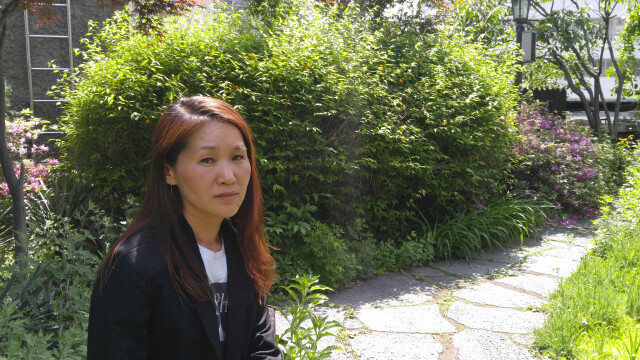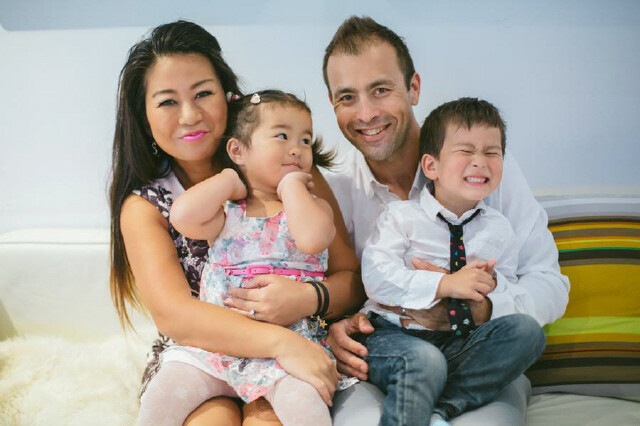hankyoreh
Links to other country sites 다른 나라 사이트 링크
Ailing adoptee from Demark hoping long wish to find blood relatives comes true

Last month, a reader sent an email with a heartfelt, urgent plea: to help realize Choi Ho-young’s final wish to find her blood relatives. Choi, 40, is a Korean-born adoptee in Denmark who is currently battling cancer. Despite six operations since it was first discovered in 2013, the cancer has spread throughout her body. Choi is currently undergoing radiation treatment in London.
The email said, “My friend Ho-young doesn’t have much time left. She’s tried asking around through South Korean police, but hasn’t been able to find anything. She was told the details about her birth parents (father Choi Deok-man and mother Kim Hak-myeong) on her Korea Social Service adoption papers from 1980 appear to be inaccurate. Our only hope was to go to the media and ask for help.”
The reader, 44-year-old Kim Yoo-ree, subsequently paid a visit to the Hankyoreh on May 5. Explaining that she too is a Korean adoptee raised in France, she brought an armload of documents from other Danish friends besides Choi who were looking for family in South Korea.
“There was a lot of adoption of Korean children to Denmark and Scandinavia between the early 1970s and early 1990s. They now make up the single largest Asian community there,” Kim explained.
“As many of them have gotten married and had children, there has been a big trend of ‘finding your roots.’ The children keep asking about their family. Everyone has talked about how May is ‘Family Month’ and May 11 is ‘Adoptee Day,’ but I have a lot of friends who have never used the words for ”mom“ and ”dad“. Many of them would like to come to South Korea at least once, but can‘t because of their financial situation.”
Kim admitted to feeling overwhelmed by the requests for help, given her own lack of experience working for an adoptee group or organization.
“Frankly, I was terrified,” she said.

“In Ho-young’s case, she‘s someone I’ve known for ten years, yet neither of us knew the other was adopted. Then one day in February, I was stunned to see her story posted on a site for Korean adoptees in Denmark. I‘d thought she was doing well - marrying her Swedish husband, having kids and a successful business in Malta. But I found out she was sick and desperately wanted to find her family.”
Seeing Kim’s post on the site, other adoptees began sending her their own adoption files.
“I’ve actually been pretty lucky,” she said. “I went back to Korea in 1993 at the age of 21, and within two weeks I found my family. I’d been adopted when I was seven, so I had clear memories of my biological parents, my siblings, even the house in Jeongneung.”
At 17, Kim left her French adoptive parents to study on her own, majoring in Korean language and literature at the National Institute for Oriental Languages and Civilizations in Paris. It was with the help of Korean friends she met at the time that she was able to find her family easily, and it was through connections formed at a part-time job assisting South Korean news outlets with local coverage that she was able to settle in South Korea in 2002, she said.
“I ended up doing part-time work with [journalist] Hong Se-hwa‘s daughter in Paris,” she recalled. “Because of that, I’ve had a lot of good teachers working with me and helping me escape my identity confusion and scars relatively well.”
Kim, who said she has written and published short stories in English, currently works a freelance film producer and interpreter. She also discussed the happiness she felt as a Korean serving as interpreter for a recent good-will match between the South Korean and Algerian Olympic soccer teams.
“In the ‘80s, I would cut out the tiniest references to South Korea from the newspaper and treasure them as a way of soothing my loneliness and longing for my mother tongue,” she said.
But beyond her own story, Kim has asked others to spread awareness about the stories of other Korean friends in Denmark. She also discussed problems with the leading role of U.S. and Christian adoptee groups in South Korea, which she said limits the ability of less proactive European adoptees to participate. While some groups and organizations do receive South Korean government support, the practical benefits to adoptees have been few - possibly because of lax management and oversight.
“I’ve looked through the adoption files my friends have sent me and found myself crying alone over the seeming hopelessness of it,” Kim said. “Even if the chances of finding the biological parents are realistically very low, I still wanted to cry with them and hold their hand and help them release some of the sorrow.”
“Ra Jong-il once said that Koreans have a peculiar sensibility that transforms sorrow into joy, and that‘s something I’ve shared in my own experience,” she said, adding that she now wants the same opportunities to happen for other friends. She also shared an email address (kimyooree@gmail.com) where readers can provide potential leads for adoptees.
By Kim Kyung-ae, staff reporter
Please direct questions or comments to [english@hani.co.kr]

Editorial・opinion
![[Editorial] Does Yoon think the Korean public is wrong? [Editorial] Does Yoon think the Korean public is wrong?](https://flexible.img.hani.co.kr/flexible/normal/500/300/imgdb/original/2024/0417/8517133419684774.jpg) [Editorial] Does Yoon think the Korean public is wrong?
[Editorial] Does Yoon think the Korean public is wrong?![[Editorial] As it bolsters its alliance with US, Japan must be accountable for past [Editorial] As it bolsters its alliance with US, Japan must be accountable for past](https://flexible.img.hani.co.kr/flexible/normal/500/300/imgdb/original/2024/0417/6817133413968321.jpg) [Editorial] As it bolsters its alliance with US, Japan must be accountable for past
[Editorial] As it bolsters its alliance with US, Japan must be accountable for past- [Guest essay] Amending the Constitution is Yoon’s key to leaving office in public’s good graces
- [Editorial] 10 years on, lessons of Sewol tragedy must never be forgotten
- [Column] A death blow to Korea’s prosecutor politics
- [Correspondent’s column] The US and the end of Japanese pacifism
- [Guest essay] How Korea turned its trainee doctors into monsters
- [Guest essay] As someone who helped forge Seoul-Moscow ties, their status today troubles me
- [Editorial] Koreans sent a loud and clear message to Yoon
- [Column] In Korea’s midterm elections, it’s time for accountability
Most viewed articles
- 1Samsung barricades office as unionized workers strike for better conditions
- 2[Column] The clock is ticking for Korea’s first lady
- 3[Editorial] When the choice is kids or career, Korea will never overcome birth rate woes
- 4S. Korea, Japan reaffirm commitment to strengthening trilateral ties with US
- 5[Editorial] As it bolsters its alliance with US, Japan must be accountable for past
- 6[Guest essay] How Korea turned its trainee doctors into monsters
- 7Japan officially says compensation of Korean forced laborers isn’t its responsibility
- 8[News analysis] After elections, prosecutorial reform will likely make legislative agenda
- 9[Editorial] Does Yoon think the Korean public is wrong?
- 10Strong dollar isn’t all that’s pushing won exchange rate into to 1,400 range